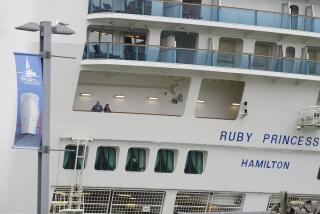Here’s What a Ship Infirmary Can Do : Cruise ship doctors have varying abilities; it’s appropriate to ask about medical staffing, equipment and insurance coverages before booking.
- Share via
Minutes after a cruise ship sets sail, experienced ship doctors brace themselves.
“People come knocking on the infirmary door,” said Dr. Oliver R. Di Pietro, the fleet physician-in-chief for Norwegian Cruise Line. They pack in such a hurry, they often forget daily medications such as blood pressure tablets or birth control pills, he said.
Then other problems can strike: Heart attack, chest pain, strokes and hip fractures are among the most serious. Garden-variety ailments abound, including sunburn, headaches, ankle sprains, bladder infections, bronchitis and colds.
“On an average seven-day cruise, on an average-size ship of about 2,000 passengers, we see about 150 patients, or 20 a day,” Di Pietro said.
No matter how minor the problem, passengers can get anxious about the quality of shipboard medicine, their jitters fueled by horror stories. One former Los Angeles cruise doctor, who last provided shipboard care in 1975, told of a colleague who was called upon to sew up a lacerated scalp without proper anesthesia and of a passenger who suffered a skull fracture but was not evacuated.
The caliber of shipboard medical care has risen since then, said Di Pietro and other cruise doctors. Still, there is room for improvement. In fact, the American College of Emergency Physicians subgroup interested in maritime medicine and headed by Dr. Carter Hill, a Seattle emergency physician, expects to issue guidelines within the next few weeks encouraging cruise lines to hire qualified physicians and to maintain certain equipment standards.
“It’s not a maritime law, but it is the standard in the industry that ships don’t sail without a physician there 24 hours, seven days a week,” said Hill, who also consults as medical director for Holland America Line and Windstar Cruises.
*
How qualified are shipboard physicians?
“It is extremely variable,” Hill acknowledged. “Our guidelines will urge the industry to try to standardize to a higher level, to hire more qualified physicians.”
Part of the difficulty, Hill said, is that many cruise lines have non-medical people making decisions about the hiring of shipboard doctors. Cost is a consideration, with a physician who accepts a lower salary often hired over a more qualified doctor who wants more money, Hill said.
Rather than specifying which type of medical training a ship doctor should have, his committee’s guidelines “will probably recommend that the industry hire (doctors) prepared (for) and capable of dealing with emergencies,” he said. “I personally feel the best would be a family physician who has experience with emergency medicine.”
Advising cruise lines on necessary medical equipment is complex, Hill said, because the optimal setup depends on the risk factors of the passengers, the distances the ship travels from ports and other variables. In general, he said, ships with 1,000 passengers should have a defibrillator (a device that restores normal heart beat), the ability to evaluate electrocardiograms (EKGs) and basic laboratory facilities for routine tests, such as a complete blood count.
Also important is a cardiac arrest team prepared to deliver prompt attention to a passenger who develops heart problems or has an attack anywhere on the ship. “I don’t think that’s consistently done,” Hill said, adding that many lines do not follow even the minimum equipment guidelines.
“The ability to do X-rays is not absolute,” Hill said, reasoning that a patient could be splinted and evacuated.
Even the best medical facilities on cruise ships can’t be compared to clinics on land. “It’s not like being at the UCLA Medical Center emergency room,” Di Pietro said. Passengers who are seriously ill are stabilized until it is possible to evacuate them to a hospital, either by air or by sailing to a port.
Evacuations are not common. Last year, 150 of the 250,000 passengers who sailed Holland America were evacuated, Hill said. Of those, 50 had heart problems, five of those had heart attacks and two of the heart attack victims died. “That’s not unusual even for the care of a heart attack (patient) off a ship,” Hill added.
Luckily, most problems don’t get this serious. Sometimes passengers create their own misery. “There is a lot of overindulgence,” Di Pietro said. “On a ship, they want to enjoy every minute.” Too much food, drink and sun top the excess list for passengers.
Caution is especially advised for the first two days, the most dangerous and likely for mishaps, according to a review of infirmary visits conducted by Holland America. “People are stressed from the first day, and they go to the captain’s party and drink too much,” Hill said. As a result, the cruise line has sometimes delayed parties until guests are more rested.
*
Passengers should consider taking along basic first-aid supplies, which might save them a trip to the infirmary or a “cabin call” (not to mention the accompanying fees, not always covered by health insurance plans), suggested Dr. Stephen Brunton, a physician at Long Beach Memorial Medical Center who often advises travelers. “Take an extra pair of eyeglasses and extra medicine,” he added.
“If you have a chronic illness, it is wise to carry a summary of your medical record,” Brunton added. Heart patients should pack a copy of their previous EKG.
Anyone who takes medicine regularly should note the name and dosage. Shipboard pharmacies are stocked with the most commonly used prescription and over-the-counter drugs but don’t always have the specific medicine a passenger needs. When a passenger can’t remember the drug name or dose, their personal physician must be contacted.
Before booking, ask about what the ship infirmary provides and about the medical staff. “It is appropriate to ask who provides the medical coverage,” said Brunton, and what the doctor’s qualifications are.
Ask about your specific medical concerns, Hill added. If you have a child with asthma, for example, ask if the ship has equipment to resuscitate. Cruise line spokespersons say they encourage such questions.
Certain medical conditions rule out cruises. Pregnant women in their third trimester are not cruise candidates, doctors agreed, no matter how trouble-free the pregnancy. But serious health problems don’t necessarily rule out cruises. Di Pietro regularly approves requests from terminal cancer patients to cruise with family members, if the patients are deemed medically stable. “It’s a nice way to spend quality time,” he said.
More to Read
Sign up for The Wild
We’ll help you find the best places to hike, bike and run, as well as the perfect silent spots for meditation and yoga.
You may occasionally receive promotional content from the Los Angeles Times.






